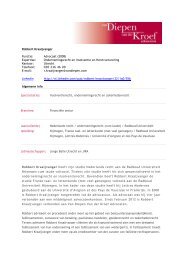© Van Diepen Van der Kroef Advocaten
© Van Diepen Van der Kroef Advocaten
© Van Diepen Van der Kroef Advocaten
- No tags were found...
You also want an ePaper? Increase the reach of your titles
YUMPU automatically turns print PDFs into web optimized ePapers that Google loves.
only in Germany. It was not disputed that in any event the German court in such a casewould offer access to justice.64. Apart from that, it is also the case that in the course of time limitations have been placedon the immunity of states. Those limitations support the viewpoint of the Association et al.that in this case no immunity should be accorded. A leading case in which the immunity ofstates is restricted is the judgment of the Hoge Raad of 25 November 1994 (NJ 1995, 650;Marokko/De Trappenberg). The State of the Netherlands dealt extensively with this case inthe motions at first instance un<strong>der</strong> numbers 3.2.9 and 3.2.10. The Association et al. refutedthose propositions un<strong>der</strong> points 27 through 31 of its statement of defence in the incidentsand refers here to those assertions. The Association et al. repeats the conclusion drawntherefrom that the Hoge Raad in that case held that exceptions to state immunity werepossible and that in that case there was an issue of such an exception.Functional versus absolute immunity65. The Association et al. will deal further with the fact that the immunity of the UN is limitedto the functional necessity for it, known as functional immunity.The District Court virtually ignored a number of aspects thereof that are decisive for thiscase. The Association et al. will in succession deal with the legal rules that apply, thepractice of international law and the interpretation thereof in the light of the ViennaConvention on Treaties. The decision in Man<strong>der</strong>lier/UN (Tribunal Brussels, Man<strong>der</strong>lier/UN,11 May 1966, 45 International Law Reports 446) should have been of seminal influence. Thatdecision was extensively dealt with at first instance by the Association et al. It is certainlyremarkable that the District Court failed to address it at all. The Man<strong>der</strong>lier/UN Case is todate the only case on the immunity of the UN.The meagre caselaw that the District Court did advance as grounds for its decision did notconcern the UN. Perhaps the reason for that omission lies in the fact that nor did the Stateof the Netherlands deal with Man<strong>der</strong>lier/UN. The District Court, in the view of theAssociation et al., too sympathetically followed the interest pleaded by the State of theNetherlands.66. The case of Man<strong>der</strong>lier against the UN had similarities with as well as differences from thepresent proceedings. The Association et al. will now address these matters.<strong>©</strong> <strong>Van</strong> <strong>Diepen</strong> <strong>Van</strong> <strong>der</strong> <strong>Kroef</strong> <strong>Advocaten</strong> page 28 of 99
















